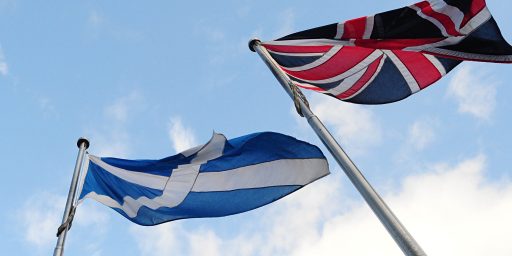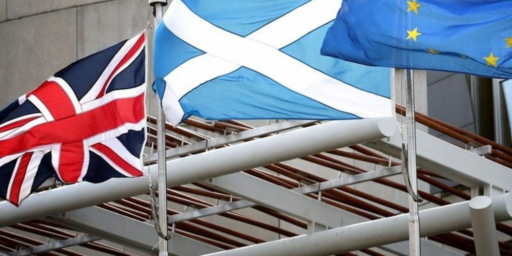Scottish Independence Referendum A Nailbiter
Scottish independence may be more likely than many think.
University of Southampton economist Arkadiusz Wiśniowski and his fellow researchers have been tracking the polls leading up to the Scottish independence referendum in mid-September, and estimate that while the polls generally have shown a ‘no’ vote narrowly leading, their model shows that the pro-independence side still has a good chance of winning:Our forecast suggests a close result, which might surprise some readers given that support for independence has never been ahead in the polls. However, this reflects the narrowing of the polls in the past few months, and our model picks up this trend – and projects it forward. The distribution of possible outcomes is centered at 49 percent, and the 95 percent predictive interval ranges from 44 percent to 54 percent. This means that we cannot conclude with any certainty about the final outcome. In other words, just two months before the referendum, the estimated odds of Scotland gaining independence against remaining in the UK remain almost even, with a very slight tendency towards the status quo.
Although there are substantial hurdles in the way of Scottish independence, political and otherwise, nonetheless the recent history of Europe suggests that even smaller states can be viable on their own, as the experiences of the various Balkan states that were part of the former Yugoslavia and the again-independent Baltic states that were illegally incorporated into the Soviet Union during World War II suggest.
On the other hand, it’s not really clear how “independent” an independent Scotland would be, given its aspiration to remain part of the European Union and its likely economic dependency on the remainder of the UK; the experience of an independent Ireland, for example, suggests that while nominally independent (particularly before Ireland joined the common currency in the late 1990s) many economic and political events were dictated by British policies and even to this day much of Ireland’s economy is based on its relations with Great Britain and Northern Ireland and many key decisions are made in the shadow of its neighbor. An independent Scotland may well find that many of the most important decisions about issues of economic and political concern are being made not in Edinburgh but in Brussels and London, with only a marginal spot at the table the former and without any influence over the latter.




Scottish MPs by party:
Labour: 41
Liberal Democrat: 11
Scottish National: 6
Conservative: 1
Unless Labour is able to recapture the Blair-era landslides, Scotland can be a decider in British elections . . . or could have been.
Chris is woefully under-informed about the strength of an independent Scottish economy. The Adam Smith Center says the Scottish economy could enjoy record growth if Scotland became independent, leaving the average Scot many thousands of pounds better off each year.
Some basic facts and figures here. http://www.businessforscotland.co.uk/10-key-economic-facts-that-prove-scotland-will-be-a-wealthy-independent-nation/
What do you consider a ‘legal’ means of acquiring territory? Conquest is a time-honored mechanism. I don’t see anyone referring to Sicily as an “illegally incorporated” part of Italy…
@DrDaveT: It is generally recognized that the “referenda” organized by the Soviets when they invaded the Baltic states and displaced the Germans were rigged, and the U.S. and other countries never recognized their annexation.
@Steve Hynd: While Scotland might well be economically viable (indeed, I pointed out that many smaller states in Europe are viable) outside the UK, and maybe more even prosperous, that doesn’t necessarily mean that Scots are going to have any more control over their fate than they do today. If Scotland decides to retain the pound sterling, for example, the Bank of England might well decide to set interest rates without considering their effect on Scotland since it would only be accountable to the RoUK, and certainly Scotland’s government would have no formal role in choosing the BoE’s governor; if Scotland were to join the euro (as required of all new states acceding to the EU), the relatively small size of the Scottish economy means that economic conditions there would not be much of a consideration in setting EU interest rates.
@Chris Lawrence:
You are wrong on a number of levels Chris.Scotland would not “have to” join the Euro.For a start there is a qualifying period and secondly an opt out could be negotiated.Next,you state that there would be no representation with the BoE.Scotland has no representation now,other than through Westminster.And they don’t have a track record of caring about Scotlands interests.The setting of interest rates may well swing in our favour,given the fact we make up a quarter of the UKs GDP.Not bad for less than 10% of the population.
The article you’ve based your post on is decent enough but doesn’t take into account an indy Scotland making stronger trade deals with her other neighbours as opposed to being controlled by Westminsters trade deals.It also rehashes old arguments which have been debunked numerous times but people like you keep trotting them out.Holding onto them like a security blanket instead of facing up to the big scary world without Nanny to hold your hand.
@Chris Lawrence:
It is generally recognized that the “referendum” organized by the United States in Hawaii when they displaced the existing monarchy was rigged, and many native Hawaiians never recognized the annexation (and still don’t).
http://www.dmzhawaii.org/?p=3194
The best way to think of the EU is as a Triple Alliance between Germany, France, and the UK with a number of of small states as minor partners. It doesn’t matter that much who the minor partners are, and Scotland seperating from the UK and becoming an “independent” minor partner changes little.
However, for Scotland to be an independent nation may boost its self-confidence, despite it making little difference in the real world. Symbols matter. So ” Scots, Wha Hae”, Braveheart, blue faces, whatnot. Down with Edward Longshanks :-).
I’ve been binging on “Long Way Round” and “Long Way Down” on Netflix, the shows where Ewan McGregor and Charley Boorman (Tomme from the Emerald Forest) travel the world on their bikes.
Ewan McGregor, a proud Scot, said something like “I’ve seen loads of anti-English feeling in Scotland, but I’ve never seen any anti-Scot feeling in England.”
It would be a pity for the union to dissolve based on that one-way street of bitterness.
@James Pearce: It would be a pity for the union to dissolve based on that one-way street of
bitterness.domination.Just pointing out that where one stands usually depends on where one sits. (or beauty is in the eye of the beholder, etc).
@goldenayr: Well, if Scotland declares independence, it may find that it has singlehandedly turned itself into a pipsqueak beset by a huge load of “gee, we never thought about THAT…!” problems.
Aside from currency and debt issues, there’s also the fact that Scotland won’t automatically be a member of the EU. (Although considering the thumpingly silly idiots on the right in England, it’s more likely that Scotland will be a member of the EU longer than England will.)
I also don’t think that England will take kindly to Scotland trotting off with all the North Sea oil, either.
@stonetools: “The best way to think of the EU is as a Triple Alliance between Germany, France, and the UK with a number of of small states as minor partners. It doesn’t matter that much who the minor partners are, and Scotland seperating from the UK and becoming an “independent” minor partner changes little.”
In terms of interest rates, aren’t they determined by Germany?
I blame Mel Gibson.
@grumpy realist: So long as Scotland creates its own free-floating, non-convertible currency and denominates its liabilities in that currency the country will not face insolvency issues. Assuming the British stupidly insist the Scots take with them a quarter of the U.K.’s central bank liabilities, then Scotland also gets a quarter of the UK’s financial assets, doesn’t it?
Free Scotland.
Chris: your remarks are pretty perceptive and you sum up the issues rather well. Incidentally, I wish I could say the same about the comments below your piece. They seem months out of date, and pretty clueless.
On the specific issue of the Arkadiusz Wiśniowski piece, I have two reactions. One is that Bayesian statistics may not be the right model to use. The actual voting numbers, predicted by polls, really have not changed much in two years, so taking a slight up-tick in the past month, and projecting it forward to the day of the vote isn’t a very reliable method.
Second, I’ve noticed that the Arkadiusz Wiśniowski piece is getting a lot of air time in the MSM and on the ‘net, and the cynic in me suspects that this is mostly because people *want* the referendum to be a cliff-hanger. A referendum that has seen Yes lose 45/55 for a solid two years just isn’t that exciting, and reporters are not in business to inform, but to sell stories, and exciting stories sell better than pointing out the obvious.
@stonetools:
You have absolutely no concept of the argument.Scotland is not leaving UK,we are the UK,the ref is not on the monarchy.It is GB that will be dissolved.And it’s about the democratic deficit,not the short sighted tribalism of the britnats.
@grumpy realist:
And you think that international boundaries should be changed because England say so?The majority of the NS is in Scottish waters.And as equal signatories to the union and any treaties signed by it,we will walk straight back in to the EU,the same as England.
Scotland is very good at punching above it’s weight.Don’t believe the entrenched elitist Westminster propaganda.
@jon livesey:
And the MSM normally regurgitate Westminster spin.The canvassing results on the doorsteps tell a different story.Polling companies are going to be left with egg on their face come the 19th.They use leading questions and only poll those who mostly favour the unionist media.
Interesting fact,Westminster recently commissioned a secret poll.They’ve refused to release it’s findings…why is that?
In many ways this is a referendum on the EU – England wants out, Scotland wants in, and if it is to stay in it needs to detach from England before the UK walks out.
Scotland has always had ties to the continent, and is much more comfortable with the new Europe than English are.
The structure of the EU gives Scotland (and the Catalans, and other suppressed nation-states) room to breath that they have not had in centuries. The Spanish will do whatever they can to block this diplomatically as they face piecemeal disintegration should devolution continue.